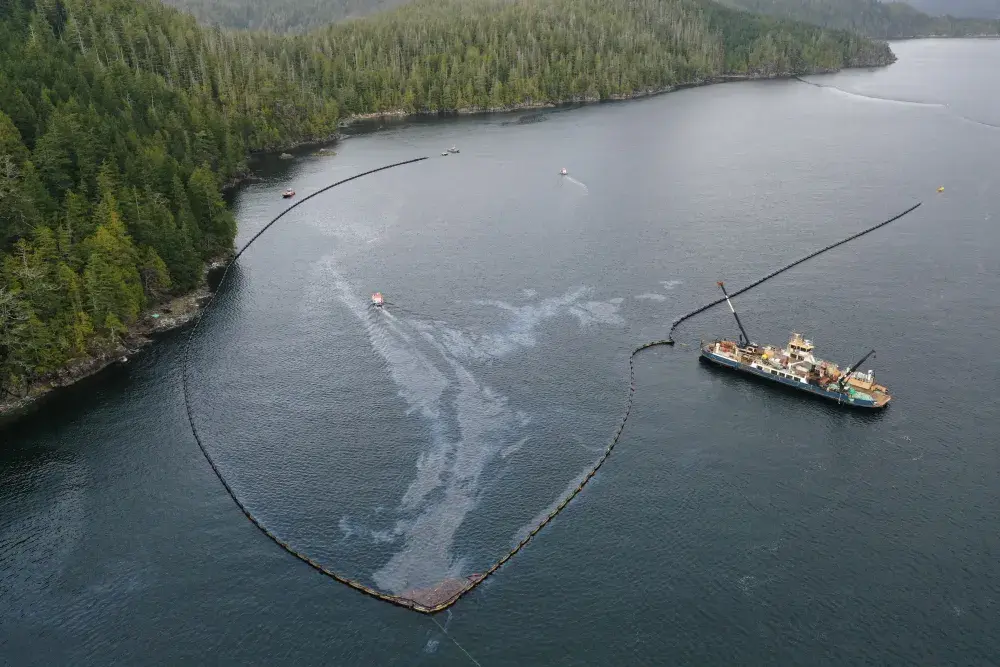A new notification system that alerts First Nations in B.C. when oil and other hazardous chemicals are spilled within their territories has just launched and is currently being rolled out province-wide.
The new system ensures that First Nation communities and individuals receive spill alerts quickly, 24/7, and that notifications are directly relevant to their self-identified needs.
The spill notification system was developed through a collaboration between 12 First Nations on the northern Pacific Coast and the B.C. government’s Ministry of Environment and Climate Change Strategy. Coastal First Nations-Great Bear Initiative has coordinated the collaboration.
According to a press release from Coastal First Nations-Great Bear Initiative, the system leverages the technology of Alertable. This is the app used by many local governments to send critical alerts to residents, businesses and visitors for extreme weather events such as floods and fires, as well as for community notices such as water advisories.
First Nations played a key role in guiding the configuration of the original technology and related notification procedures. Early on, participating First Nations led a virtual exercise to identify gaps and challenges in the old system. They also participated in a pilot project to test and refine the technology.
“Rapid and efficient notification, as with any emergency or disaster, can significantly reduce impacts,” said Kaitlin Minvielle, emergency program coordinator with the Nuu-chah-nulth Tribal Council. “Early notification not only enhances collaboration between nations, the provincial government and spill identifiers but also allows nations to safeguard culturally significant sites that may not be widely known.”
With this new system, First Nation governments are able to define their geographic areas of interest for receiving notifications, and community members can sign up to receive real-time notifications by phone, text, or email when incidents occur.
“Given that we have early warning notification systems for other disasters and emergencies, such as earthquakes, a spill response notification system is clearly necessary,” Minvielle said. “Coastal First Nations are particularly vulnerable to spills, which can lead to food loss, damage to culturally significant sites and economic impacts.”
Minvielle added that while the development of the new app is long overdue, it is not significantly behind other systems like the Canadian Earthquake Early Warning System that was launched this spring.
The new notification approach replaces a manual method, which often resulted in notification gaps and delays, according to the news release.
The old system required ministry staff to determine which First Nations should be notified and to triage the highest priority spills for notification. Notifications were made by phone to numbers only answered during business hours, and responders relied on contact databases that required ongoing maintenance.
“Delays in oil spill notifications can severely harm marine life in several ways,” Minvielle said. “Prolonged exposure to toxic substances can cause immediate harm or death to marine organisms. Without prompt containment, oil can spread over larger areas, contaminating more habitats and species, and affecting shorelines, estuaries and breeding grounds.”
Minvielle added that persistent oil contamination leads to chronic health issues and reproductive damage, resulting in marine population declines.
“Sensitive and critical habitats, such as coral reefs and marshlands, are more vulnerable and harder to protect with delayed responses,” she said. “Marine mammals and birds are especially at risk, as oil coats their fur or feathers, reducing insulation and causing hypothermia, poisoning, and death upon ingestion. Additionally, delays can impact human communities relying on marine resources, leading to economic hardships and reduced food security.”
First Nations that participated in the development of the notification system were Heiltsuk Nation, Kitasoo Xai’Xais Nation, Nuxalk Nation, Wuikinuxv Nation, Council of the Haida Nation, Metlakatla Stewardship Society and Nanwakolas Council, which represents Mamalilikulla, Tlowitsis, Da’naxda’xw Awaetlala, Wei Wai Kum, We Wai Kai and K’ómoks First Nations.
The new notification system is currently being rolled out to other First Nations across B.C. As of June 2024, 22 First Nations are receiving notifications and the system is proving to be reliable and effective.
“We are pleased to have worked together with our provincial government partners on this,” said Christine Smith-Martin, CEO of the Coastal First Nations-Great Bear Initiative, in a press release. “It’s so important that the new notification system is informed by Indigenous perspectives and needs, and the process undertaken to develop it reflects the shared commitment to collaboration and co-management of our marine ecosystems. We feel confident that this new system will be a vast improvement in getting information to First Nations leaders, staff and community members.”
First Nations in B.C. interested in adopting it can reach out to spillresponse@gov.bc.ca to express interest.

